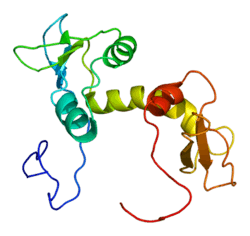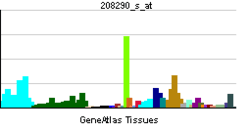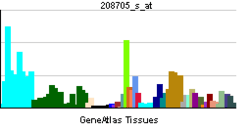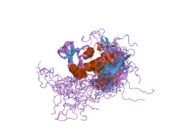EIF5
| View/Edit Human | |||
Eukaryotic translation initiation factor 5 is a protein that in humans is encoded by the EIF5 gene.[2][3]
EIF5 is a GTPase-activating protein.[4]
References
- ↑ "Human PubMed Reference:".
- ↑ Si K, Das K, Maitra U (Aug 1996). "Characterization of multiple mRNAs that encode mammalian translation initiation factor 5 (eIF-5)". J Biol Chem. 271 (28): 16934–8. doi:10.1074/jbc.271.28.16934. PMID 8663286.
- ↑ "Entrez Gene: EIF5 eukaryotic translation initiation factor 5".
- ↑ Das S, Ghosh R, Maitra U (March 2001). "Eukaryotic translation initiation factor 5 functions as a GTPase-activating protein". J. Biol. Chem. 276 (9): 6720–6. doi:10.1074/jbc.M008863200. PMID 11092890.
External links
- Cap-dependent translation initiation from Nature Reviews Microbiology. A good image and overview of the function of initiation factors
Further reading
- Das S, Maiti T, Das K, Maitra U (1998). "Specific interaction of eukaryotic translation initiation factor 5 (eIF5) with the beta-subunit of eIF2.". J. Biol. Chem. 272 (50): 31712–8. doi:10.1074/jbc.272.50.31712. PMID 9395514.
- Bandyopadhyay A, Maitra U (1999). "Cloning and characterization of the p42 subunit of mammalian translation initiation factor 3 (eIF3): demonstration that eIF3 interacts with eIF5 in mammalian cells.". Nucleic Acids Res. 27 (5): 1331–7. doi:10.1093/nar/27.5.1331. PMC 148320
 . PMID 9973622.
. PMID 9973622. - Das S, Maitra U (2000). "Mutational analysis of mammalian translation initiation factor 5 (eIF5): role of interaction between the beta subunit of eIF2 and eIF5 in eIF5 function in vitro and in vivo.". Mol. Cell. Biol. 20 (11): 3942–50. doi:10.1128/MCB.20.11.3942-3950.2000. PMC 85746
 . PMID 10805737.
. PMID 10805737. - Choi SK, Olsen DS, Roll-Mecak A, et al. (2000). "Physical and functional interaction between the eukaryotic orthologs of prokaryotic translation initiation factors IF1 and IF2.". Mol. Cell. Biol. 20 (19): 7183–91. doi:10.1128/MCB.20.19.7183-7191.2000. PMC 86272
 . PMID 10982835.
. PMID 10982835. - Das S, Ghosh R, Maitra U (2001). "Eukaryotic translation initiation factor 5 functions as a GTPase-activating protein.". J. Biol. Chem. 276 (9): 6720–6. doi:10.1074/jbc.M008863200. PMID 11092890.
- Wiemann S, Weil B, Wellenreuther R, et al. (2001). "Toward a catalog of human genes and proteins: sequencing and analysis of 500 novel complete protein coding human cDNAs.". Genome Res. 11 (3): 422–35. doi:10.1101/gr.GR1547R. PMC 311072
 . PMID 11230166.
. PMID 11230166. - Asano K, Shalev A, Phan L, et al. (2001). "Multiple roles for the C-terminal domain of eIF5 in translation initiation complex assembly and GTPase activation.". EMBO J. 20 (9): 2326–37. doi:10.1093/emboj/20.9.2326. PMC 125443
 . PMID 11331597.
. PMID 11331597. - Majumdar R, Bandyopadhyay A, Deng H, Maitra U (2002). "Phosphorylation of mammalian translation initiation factor 5 (eIF5) in vitro and in vivo.". Nucleic Acids Res. 30 (5): 1154–62. doi:10.1093/nar/30.5.1154. PMC 101238
 . PMID 11861906.
. PMID 11861906. - Strausberg RL, Feingold EA, Grouse LH, et al. (2003). "Generation and initial analysis of more than 15,000 full-length human and mouse cDNA sequences.". Proc. Natl. Acad. Sci. U.S.A. 99 (26): 16899–903. doi:10.1073/pnas.242603899. PMC 139241
 . PMID 12477932.
. PMID 12477932. - Marintchev A, Kolupaeva VG, Pestova TV, Wagner G (2003). "Mapping the binding interface between human eukaryotic initiation factors 1A and 5B: a new interaction between old partners.". Proc. Natl. Acad. Sci. U.S.A. 100 (4): 1535–40. doi:10.1073/pnas.0437845100. PMC 149867
 . PMID 12569173.
. PMID 12569173. - Ota T, Suzuki Y, Nishikawa T, et al. (2004). "Complete sequencing and characterization of 21,243 full-length human cDNAs.". Nat. Genet. 36 (1): 40–5. doi:10.1038/ng1285. PMID 14702039.
- Gerhard DS, Wagner L, Feingold EA, et al. (2004). "The status, quality, and expansion of the NIH full-length cDNA project: the Mammalian Gene Collection (MGC).". Genome Res. 14 (10B): 2121–7. doi:10.1101/gr.2596504. PMC 528928
 . PMID 15489334.
. PMID 15489334. - Rual JF, Venkatesan K, Hao T, et al. (2005). "Towards a proteome-scale map of the human protein-protein interaction network.". Nature. 437 (7062): 1173–8. doi:10.1038/nature04209. PMID 16189514.
- Homma MK, Wada I, Suzuki T, et al. (2005). "CK2 phosphorylation of eukaryotic translation initiation factor 5 potentiates cell cycle progression.". Proc. Natl. Acad. Sci. U.S.A. 102 (43): 15688–93. doi:10.1073/pnas.0506791102. PMC 1266118
 . PMID 16227438.
. PMID 16227438. - Conte MR, Kelly G, Babon J, et al. (2006). "Structure of the eukaryotic initiation factor (eIF) 5 reveals a fold common to several translation factors.". Biochemistry. 45 (14): 4550–8. doi:10.1021/bi052387u. PMID 16584190.
- Bieniossek C, Schütz P, Bumann M, et al. (2006). "The crystal structure of the carboxy-terminal domain of human translation initiation factor eIF5.". J. Mol. Biol. 360 (2): 457–65. doi:10.1016/j.jmb.2006.05.021. PMID 16781736.
- Olsen JV, Blagoev B, Gnad F, et al. (2006). "Global, in vivo, and site-specific phosphorylation dynamics in signaling networks.". Cell. 127 (3): 635–48. doi:10.1016/j.cell.2006.09.026. PMID 17081983.
This article is issued from Wikipedia - version of the 6/6/2016. The text is available under the Creative Commons Attribution/Share Alike but additional terms may apply for the media files.





